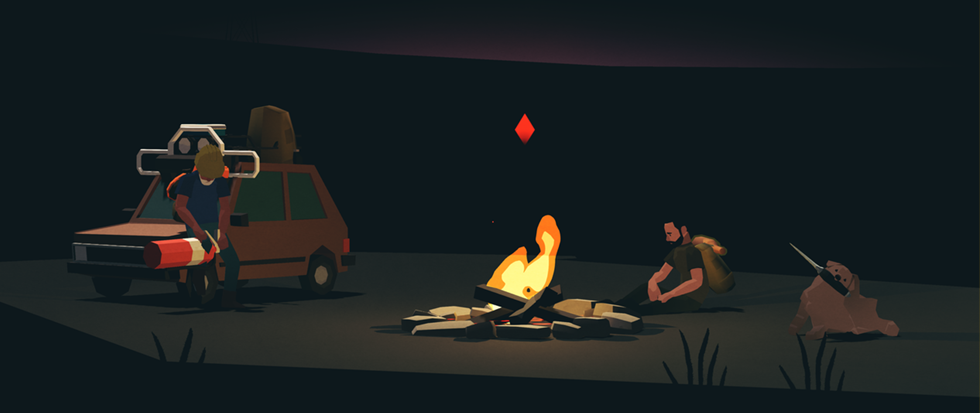
The Dioramic Ambiance of Overland
The how and the why don’t matter. If and when the fragile scaffolding of society collapses, survivors won’t get a telegram summarizing why our cities fell. An estimation of their luck will be a matter of perspective, but whatever catastrophe comes down, odds are what’s left will be scarce. Resources, civilization, and humanity will be mere wisps. In Overland’s postulation, a post-apocalypse of carnivorous bugs will ascend, complete with the forethought to post up around the cans of gasoline that power a hopeful minivan of puppers towards rumors of safety out West.
Finji has been grinding through Overland since going First Access with Itch.io in 2016, allowing players to pick through the exposed joints of this dioramic carload-based tactical survival game as it grows cell-by-cell, build-by-build. But the kernel has remained the same: Gather a crew of varying histories and abilities and try to cut through claustrophobic grids in search of supplies, survivors, and good boys. Each game spins out a fresh variety of hell, where every decision is damn near the last as a cavalcade of to-date unnamed subterranean bugs continually burst out and, as your companions repeatedly note, hunt you down mercilessly.
I’ve been dipping in and out of Overland since its first public skeleton was released and it’s been consistently tense. I’ve never had the stomach for other tactical games like Fire Emblem because I can’t stand to lose any warriors, but I understand that survival and war requires sacrifice. This desire to protect my people boils my blood, and the Finji crew knows how to torque the wrench move by move, and it doesn’t take much. The characters you start with and find throughout the game are randomly-generated and given one line of backstory like “Was struck by lightning as a child” or “Didn’t spend enough time with his kids.” They’re all very Hemingway-ian in their simplicity, which fits the Overland modus operandi so far: by doing less they’re planting the seeds for player generation of the narrative, tending their own stories of failure and maybe success, eventually.
Because Overland arcs the difficulty as you trundle through its biomes, I always die in the mountains. The tension that buttresses every decision, coupled with the affinity I feel for my team and the shame I endure when leaving someone to fend for themselves or causing sweet four-pawed Bently to get caught in an explosion (god Bently I’m sorry stop haunting my dreams!). I want to blame the game when I’m caught in a wildfire but every step is a risk, every reward merely a rumor.
Where other isometric tactical games leave me overwhelmed, Overland is a quiet, precise affair. It’s charm is rooted in this ambiance, the occasional roadside camp you come across, a stranger who cruises up from the rear and recognizes that rando you picked up back in New Boston. The sound design is a zephyr, composing through the rain or the crawling fire, punctuated by the screams of the bugs you kill or are calling out to their brethren. The further west you go things get weird, with floating rocks and squirming tendrils that harm you for stopping on them. Whatever these creatures are, you’re trying to break through their front line with sticks and knives, bottles and flare guns if you’re lucky. And the cyclical night, that horrid map that launches bugs from the inky fog of war, that I always swear I’ll prepare for better but I keep losing track of time.
If the calamitous consequences of Final Fantasy Tactics set me on edge, Overland should rend me right batty. But it’s bite-sized enough to make my mistakes digestible, and each run-through gives me a fresh squad, a chance to tell the story correct. I’m allowed to learn from my mistakes rather than merely grind my way up to strength, and suffer for ill-advised risks and gas-stingy roadside wreckage. Impossible situations can be managed, usually through sacrifice. Anxiety throbs through each bite-sized morsel, but every mistake is a result of my hubris or inability to plan ahead. Still, I camp out and try my best, collecting strays of every shape and size to build our own narrative and carve tiny stories from the blackened stump of a blasted civilization.





